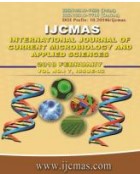


 National Academy of Agricultural Sciences (NAAS)
National Academy of Agricultural Sciences (NAAS)

|
PRINT ISSN : 2319-7692
Online ISSN : 2319-7706 Issues : 12 per year Publisher : Excellent Publishers Email : editorijcmas@gmail.com / submit@ijcmas.com Editor-in-chief: Dr.M.Prakash Index Copernicus ICV 2018: 95.39 NAAS RATING 2020: 5.38 |
A field experiment was conducted during the winter season of 2013-14 and 2014-15 at Sijhauri village of Jamui district (Bihar) in farmers participatory mode to study the effect of different sowing methods, herbicides and rhizobium culture on yield and economics of lentil (Lens culinaris L.). The experiment was laid out in randomized block design comprising of eight treatment replicated thrice. The treatment were as T1 – Zero tillage, T2 – Conventional tillage, T3 – ZT + Pendimethalin @ 1.00 kg ai ha-1, T4- Zero tillage + pendimethalin at 1.00 kg as pre-emergence +Seed inoculation through Rhizobium culture T5- Zero tillage + seed inoculation through Rhizobium culture, T6- Conventional tillage + Pendimethalin at 1.00 kg ai ha-1 as pre-emergence, T7- Conventional tillage + Pendimethalin at 1.00 kg ai ha-1 as pre-emergence + Seed inoculation through Rhizobium culture and T8 – Conventional tillage + Seed inoculation through Rhizobium culture. Zero tillage method of sowing recorded minimum weed population, minimum weeds dry weight (22.3 g) and maximum weed control efficiency (28.98 %) which was significantly superior to that recorded under conventional tillage. The results also revealed that treatment T4 was the best treatment with regard to weed control, growth parameters and yield attributes and yield. Zero tillage method of sowing recorded significantly higher values of all the growth parameters viz. plant height (42 cm), no. of branches plant-1 (5.30), no. of pods plant-1 (34), no. of seeds pod-1 (1.85) and test wt. (24.50 g) above conventional tillage and among the treatment combinations treatment T4- Zero tillage + pendimethalin at 1.00 kg as pre-emergence +Seed inoculation through Rhizobium culture recorded highest growth parameters and grain yield (10.94 q ha-1). The maximum net return was obtained with treatment T4 (Rs. 36,280) and B: C ratio of 1.70.
 |
 |
 |
 |
 |